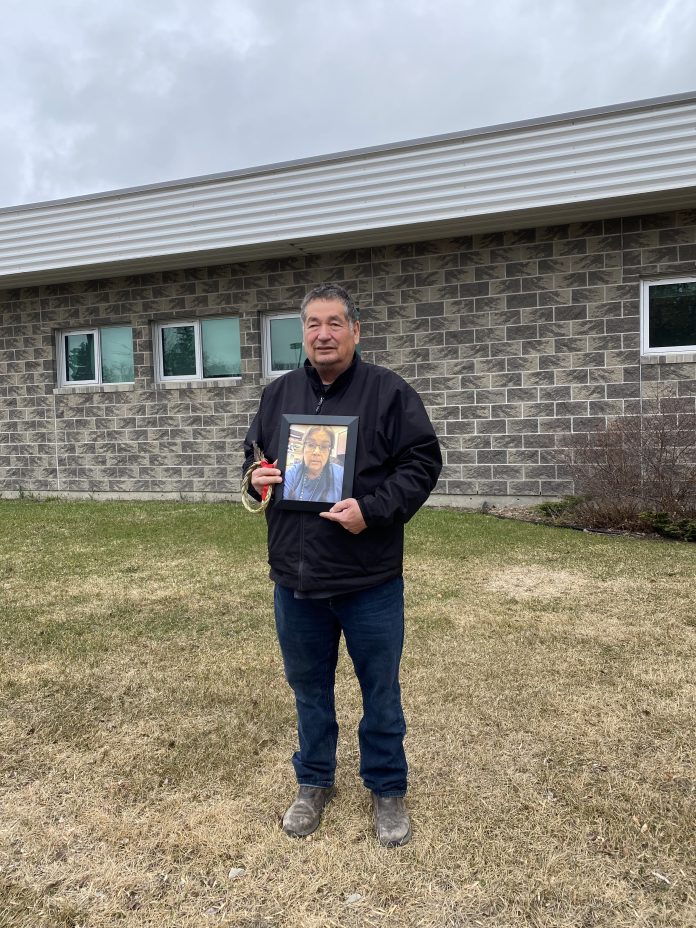
Following the release of a timeline marking the movements of Myles Sanderson’s homicidal attack on the communities of James Smith Cree Nation and nearby village of Weldon, Darryl Burns holds out hope that what happened the morning of Sept. 4, 2022, is enough to evoke change in Canada so that it never happens again.
“I hope my sister’s death hasn’t just been an empty one, I want her death to mean something,” said Darryl. “I want her death to have some sort of a teaching or lesson for not only our family, but all the Indigenous communities across Canada.”
Darryl’s sister Gloria Burns, 61, worked alongside him on the James Smith Cree Nation Crisis Management Team as a first responder when the stabbings unfolded in the early morning hours of September 4.
Gloria was killed while responding to a call for help from her friend Bonnie Burns, who also died along with her son Gregory Burns.
His sister’s bravery that day doesn’t come as a surprise to Darryl.
“For her to answer a call that morning and go to her friend’s aid was natural for her. That’s just the way she was,” said Darryl. “I’m very proud of my sister for what she’s done and the way she acted that morning. I know in my heart that she’s a hero [and] she did what she needed to do that day.”
Authorities revealed that in the days leading up to the murders, Myles and Damien Sanderson travelled around James Smith Cree Nation dealing drugs to community members. Both brothers reportedly had a history of substance abuse.
“My sister and Myles had something in common, and so did the rest of the victims here; we were all a victim of drugs and addictions,” said Darryl. “If you go behind the addictions and look at all the trauma that we’ve suffered, we all have that in common. We have to start dealing with the trauma, we have to start looking at the truth of this and we all have to take responsibility.”
He said that change needs to begin by teaching First Nations youth to be proud of themselves and their culture.
“They are strong, resilient people and they have a lot to be proud of,” said Darryl. “Hopefully if we start to be proud of ourselves, we never have people growing up and having the same issues as Myles and Damien.”
In a statement on Thursday following the Saskatchewan RCMP’s presentation, Chakastaypasin Chief Calvin Sanderson and Peter Chapman Band Chief Robert Head both said the James Smith Cree Nation community is struggling with drug problems.
“Many people are plagued by addictions in the aftermath of the tragedy,” said Calvin. “As leadership, we are working to answer the cries of our people for help, but the policies have to change so those involved in drugs and criminal activities can be removed, sent for treatment or provided with a pathway to healing.”
The sentiment was echoed by Robert, who also asked that the RCMP be proactive in cracking down on drug dealers that operate out of the community.
The Saskatchewan Coroners Service has scheduled two inquests for early 2024. One will look into the 11 homicides that occurred in James Smith Cree Nation and the nearby village of Weldon, and another will examine the death of Myles Sanderson.
“The purpose of the inquest is to advise the public of the circumstances of the events and really, to come up with some recommendations that will hopefully supersede so this wouldn’t happen again into the future,” explained Chief Coroner Clive Weighill.
The Parole Board of Canada, Corrections, RCMP, Saskatchewan’s forensic pathologist who conducted the medical exams will all give testimony, as will any other witness the inquest counsel deems appropriate.
Darryl said the people of James Smith Cree Nation need to be prepared for what could be revealed during the inquests.
“It’s not going to be good and there’s going to be a lot of negative emotions coming out of that,” said Darryl. “I’m afraid that if that information comes out and it’s not handled in a good way and we’re not prepared for that day, it could divide our community even more.”
According to Weighhill, the initial part of the coroner’s inquest is set to begin in Melfort on January 15, 2024, and is expected to take between two to three weeks.

